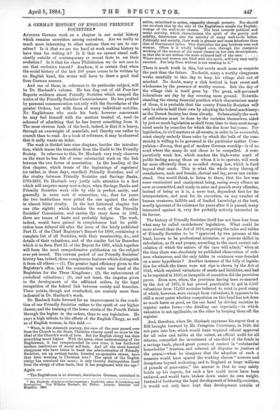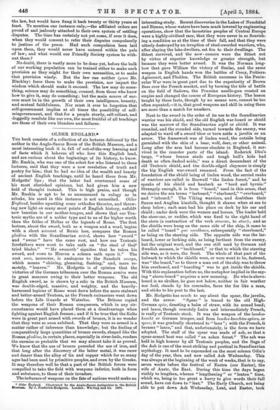A GERMAN HISTORY OF ENGLISH FRIENDLY SOCIETIES.* ANOTHER German work
on a chapter in our social history which remains unwritten among ourselves. Are we really so much more interesting to other nations than we are to our-
selves P Is it that we are too hard at work making history to have time for writing it ? Is it that we cannot stand suffi- ciently outside of contemporary or recent facts to see their evolution P Is it that for sheer Philistinism we do not care to see that evolution traced ? Anyhow, it is certain that when the social history of the last 100 years comes to be written by an English hand, the writer will have to draw a good deal from German sources.
And one of these, in reference to its particular subject, will be Dr. Hasba.ch's volume. He has dug out of old Poor-law Reports evidence about Friendly Societies which escaped the notice of the Friendly Societies Commissioners. He has profited by personal communication not only with the Secretaries of the greater Orders, but with those of many individual societies. No Englishman who reads his book, however conversant lie may feel himself with the matters treated of, need. • be ashamed of admitting that he has learnt something from it. The most obvious fault of the book, indeed, is that it is heavy, through an overweight of materials, and thereby one rather to consult than to read. As a book of reference, it may be observed that it sadly wants an index.
The work is divided into nine chapters, besides the introduc- tion, which traces the transition from the Guild to the Friendly Society. In reference to this, Dr. Hasbach very truly observes on the want he has felt of some substantial work on the link between the two forms of association. In the heading of the first chapter, which treats of the beginnings of registered (or rather, in those days, enrolled) Friendly Societies, and of the rivalry between Friendly Societies and Savings Banks,
1793-1819, Dr. Hasbach very justly calls attention to a fact which will surprise many now-a-days, when Savings Banks and Friendly Societies work side by side in perfect amity, and generally in some sort of connection, viz., that for years the two institutions were pitted the one against the other in almost bitter rivalry. In the last historical chapter but one (the eighth) which includes the work of the Friendly Societies' Commission, and carries the story down to 1882, there are traces of haste and probably fatigue. The work, indeed, would have gained in completeness had its publi- cation been delayed till after the issue of the lately published Part II. of the Chief Registrar's Report for 1680, containing a complete list of all Societies, with their membership, Sze., and details of their valuations, and of the similar list for Branches which is to form Part II. of the Report for 1881, which together will form the most comprehensive publication on the subject ever yet issued. The current period of our Friendly Societies'
history has, indeed, three conspicuous features which distinguish it from all others : — (1), The greater legal efficiency given to the
Registrar's office, and the connection under one head of the Registries for the Three Kingdoms ; (2), the enforcement of periodical valuations ; (3), and not least, the impetus given to the development of the affiliated orders, by the legal recognition. of the federal link between society and branches. These points, though not overlooked, are scarcely more than indicated in Dr. Hasbach's work.
Dr. Hasbach looks forward for an improvement in the condi-
tion of our Friendly Societies rather to the spirit of our higher classes, and the training of the lower strata of the Fourth Estate
through the higher in the orders, than to any legislation. He pays a high tribute to the efforts of the English Clergy, as well as of English women, in this field :—
"When, in the sixteenth century, the care of the poor passed over from the Church to the State, Christian charity could no more be the ideal of the Church's work of love. But the English clergy has done something much higher. With the quiet, clear understanding of the Englishman, it has comprehended its own time, it has furthered modern institutions of social self-help. And all the stout-hearted clergymen who have taken in hand the administration of Friendly Societies, set up-savings-banks, founded co-operative stores, have they been wanting in Christian love ? The spirit of the English clergy has remained the same; it only thereby distinguishes itself from the clergy of other lands, that it has progressed with the age."
Again :— " The Englishman is no abstract, doctrinaire German, untrained in Des Englische Arbeitelvarsicherungswesen ; Geschichte seiner En twickehing und Geselegebung. Von Wilhelm Hasbach, Dr. Philos. Leipzig : Duneker and Rumblot.
action, uninclined to action, niggardly through poverty. Nor shonkl one overlook that by the side of the Englishman stands the English- woman of the well-to-do classes. The bent towards political and swell activity, which characterises the spirit of the gentry and nobility, determines also the activity of many well-to-do ladies. Politically and socially, their work is greater and more laborious than that of Continental ladies. This diminishes the gap between man and woman. Often is it wholly bridged over, through the energetic working of the woman of the upper classes on her own development, so that she is not seldom the more cultured half of the man Where men and women are filled with this spirit, self-help may easily succeed. For help from without is not wanting to IL"
There is much truth in this, but surely much more as respects the past than the future. No doubt, many a worthy clergyman
works manfully to this day to keep his village club out of mischief. No doubt, many a dab festival is kept sweet and wholesome by the presence of worthy women. But the day of the village club is itself gone by. The great, self-governed federations are day by day covering. more ground. Notwith- standing the strong financial position which characterises many of them, it is probable that the county Friendly Societies will
only be able to hold their own by adopting the federal machinery. as the Dorset Society has done already. Substantially the work of self-reform must be done by the societies themselves, aided by just so much legislation as shall from time to time meet recog- nised needs by remedies for which the due hour has:come. For legislation, in civil matters at all events, in order to be successful, must simply embody those rules by which the balk of the cam-.
munity is willing to be governed in the particular matter. Com- pulsion—Zwang, that god of modern German worship—is of no avail where the many do not chose to be compelled. A com- paratively weak law, which reaches the high-water mark of public feeling among those on whom it is to operate, will work far more efficiently than a so-called strong law, which is fixed beyond that mark. This is what the whole noisy throng of crotcheteers, male and female, clerical and lay, never can under- stand. One would think, to listen to them, that the law was some omniscient and omnipotent being, seeing every offence as soon as committed, and ready to seize and punish every offender, instead of being as it is, a mere text, dependent first for its interpretation, and next for its execution, on any number of human creatures, fallible and of limited, knowledge at the best, mostly ignorant of its existence for years after it is passed, many interested against it, very few probably actively interested in its favour.
The history of Friendly Societies itself has not been free from what may be called crotcheteers' legislation. What could be more absurd than the Act of 1819, requiring the rules and. tables of Friendly Societies to be "approved by two persons at the least, known to be professional actuaries, or persons skilled in calculation, as fit and proper, according to the most correct cal- culation of which the nature of the case will admit," when at the time there was absolutely no published observation of sick- ness whatsoever, and the only tables in existence were founded on a mere hypothesis ? Another instance of the folly of legisla- tion for which the times were not ripe is shown by the Act of 1846, which required valuations of assets and liabilities, and had
to be repealed in 1850, so incapable of execution did the provision prove. Even now, when, the provision having been re-enacted by the Act of 1875, it has proved practicable to get in 6,56Z valuations from 17,053 societies believed to exist (a good many of which, however, were exempt from valuation), it appears to be still a moot point whether compulsion on this head has not done as much harm as good, on the one hand by driving societies to
register under forms—the dividing one especially—to which valuation is not applicable, on the other by keeping them off the register.
And, therefore, when Dr. Hasbach expresses his regret that a Bill brought forward by Mr. Peregrine Courtenay, in 1828, did
not pass into law, which would have required official approval for all rules and tables at the outset, an official audit for all returns, compelled the investment of one-third of the funds in a savings bank, placed great powers of control in "substantial householder" trustees, and referred all disputes to justices of the peace,—when he imagines that the adoption of such a measure would have spared the working classes "sorrows and deceptions beyond reckoning, and to England at large millions of pounds of poor-rates," the answer is that he may safely bottle up his regrets, for such a law could never have been endured, and would have broken down under its own weight.
Instead of furthering the legal development of friendly. societies, it would not only have kept that development outside of the law, but would have flung it back twenty or thirty years at Least. To mention one instance only,—the affiliated orders are proud of and jealously attached to their own system of settling -disputes. The time has certainly not yet come, if ever it does, when they would consent to refer their disputes compulsorily to justices of the peace. Had such compulsion been laid 'upon them, they would never have entered within the pale -of law; and what would our Friendly Simiety system be with- -out them ?
No doubt, there is vastly more to be done yet, before the bulk 4f our working population can be trained either to make such provision as they might for their own necessities, or to make that provision wisely. But the law can neither (pace Mr. Blackley) force them to make the provision, nor impart the wisdom which should make it succeed. The law may do some- thing, science may do something, counsel, from those who know how to give it, may do something; but the main source of suc- cess must be in the growth of their own intelligence, honesty, and mutual faithfulness. Nor must it over be forgotten that self-government implies at all times the possibility of self- misgovernment, and that for a people sturdy, self-reliant, and doggedly resolute like our own, the most fruitful of all teachings are those of their own blunders and failures.















































 Previous page
Previous page